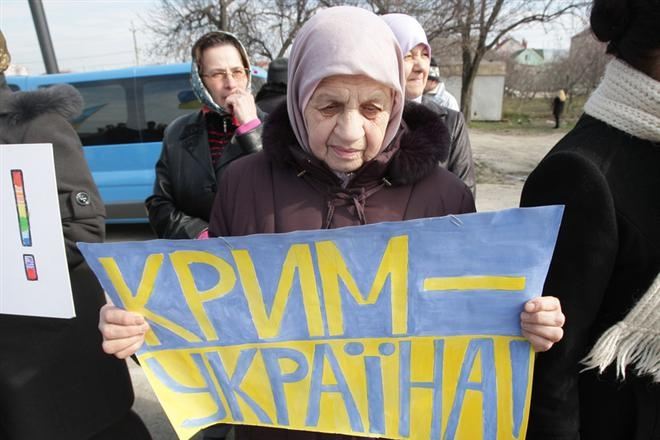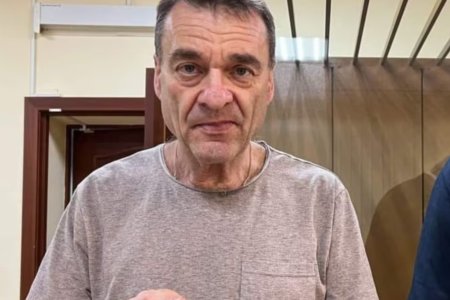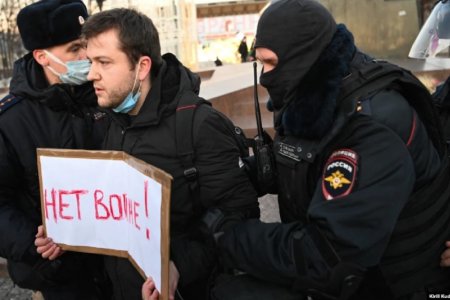
A draft bill tabled in Russia’s Duma on 22 January would allow for the confiscation of property where people have been convicted of so-called ‘military fakes’ and imprisoned for criticizing Russia’s war of aggression against Ukraine or reporting Russia’s war crimes. The bill proposed, which has every chance of being pushed through into law, could also be used against those Ukrainians who state, in full accordance with international law, that Crimea and other occupied territory are Ukrainian.
The authors of the bill include Viacheslav Volodin, speaker of Russia’s Duma and several other deputies notorious for their role in pushing through extremely repressive legislation. On the eve of its registration in parliament, Volodin said that the bill was aimed at “punishing scoundrels”, including cultural figures, “who support Nazis, hurl mud at our country, soldiers and officers taking part in” what he euphemistically referred to as the ‘special military operation’, i.e. Russia’s war of aggression against Ukraine. “Anyone who tries to destroy Russia, betrays it, and should incur deserved punishment and compensate the state for the damage caused from their property.”
A cursory glance at the list of those sentenced to 6-8 years under Article 207.3 of Russia’s criminal code (for the supposed “public circulation of knowingly false information about the use of the Russian Federation armed forces” will make it clear that those targeted had condemned Russia’s war crimes against Ukrainian civilians, its atrocities in Bucha, Mariupol and Izium, etc.
As well as covering those convicted under Article 207.3, Volodin reports that it will “enable confiscation of money, assets or other property used or designated for financing criminal activities against the Russian Federation’s security”. A court could also order that a person be stripped of honorary titles. The claim about actions against state security considerably broadens the scope of this bill. Confiscation would be allowed, for example, where a person was convicted of ‘public calls to carry out extremist activities” (Article 280). Given the repressive legislation now in force in Russia and occupied parts of Ukraine, such allegedly ‘extremist activities’ could include a Jehovah’s Witness invitation to take part in Bible studies or public worship.
Application of this new repressive norm would be even more likely against Ukrainians for calling Crimea (or other occupied territory) sovereign Ukrainian territory. This could incur prosecution under Article 280.1 of Russia’s criminal code. The norm against those claimed to have called for ‘action aimed at violating Russia’s territorial integrity’ came into force just three months after Russia’s invasion and annexation of Crimea. It has already, as feared, been used against Crimean Tatars and other Ukrainians (Mejlis leader Ilmi Umerov; journalist Mykola Semena, and activist Suleiman Kadyrov for calling Crimea Ukrainian and opposing Russia’s illegal occupation.
Other articles of the criminal code listed in the new bill include the second criminal charge rushed into law after Russia’s full-scale invasion of Ukraine, namely ‘public actions aimed at discrediting the use of the Russian armed forces’ (Article 280.3).
The others that Volodin mentions are also those used as weapons of repression, aimed at silencing protest. They are: ‘public calls to carry out activities against state security (Article 280.4); calls to introduce sanctions against the Russian Federation and its citizens (Article 284,2); assisting the implementation of decisions of international organizations which the Russian Federation is not a party to, or of foreign state bodies (Article 284.3). rehabilitation of Nazism (Article 354.1). Lest the title of the last item be misleading, this has been used to prosecute Russian Vladimir Luzgin for posting a text that quite correctly stated that both Nazi Germany and the Soviet Union invaded Poland in 1939. It was recently also used to convict and impose a massive fine against Russian architect Sergei Volkov for writing (accurately) about the collaboration between the USSR and Nazi Germany for the first two years of World War II, and for his criticism of Soviet dictator Joseph Stalin in connection with the Siege of Leningrad.
The above-mentioned Article 280.4 already includes a number of other charges, including state treason and spying. The bill now before the Duma proposes to add elements to the article so that it falls under its scope, and to supplement Article 280.4 § 2 to include ‘for mercenary motives or for hire’, and ‘for motives of political, ideological, racial, ethnic, or religious enmity.’
Network Freedoms noted that this would enable the more serious paragraph 2 of the Article to be applied against those simply making public statements offline. The independent publication is, however, restrained in its assessment of the new bill. It points out that Russia’s options for confiscation differ from those in Soviet times, with them applying only to property received or used to carry out the alleged ‘offences’ listed above. They note also that such confiscation is, at least presently, not often applied, and that almost no prosecutions over so-called ‘military fakes’ have claimed mercenary motives. In any case, the potential punishment envisaged by Article 207.3 is already massive (fines of between 3 and 6 million roubles).
The publication is inclined to see this as the “latest scare tactic’. This may well be the case, however any such repressive norms can, given the will, be applied, and this would be another weapon of repression in Russia’s already considerable arsenal against Ukrainians on occupied territory.


